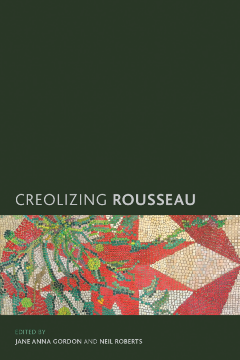
Additional Information
Book Details
Abstract
In 1967, C.L.R. James, the much-celebrated Afro-Trinidadian Marxist, stated that he knew of no figure in history who had “such tremendous influence on such widely separated spheres of humanity” within a few years of his death as the eighteenth-century philosopher Jean-Jacques Rousseau. While this impact was most pronounced in revolutionary politics inspired by political theories that rejected basing political authority in monarchy, aristocracy, and the Church, it extended to European literature, to philosophies of education, and the articulation of the social sciences. But what particularly struck James about Rousseau was the strong resonance of his work in Caribbean thought and politics.
This volume illuminates these resonances by advancing a creolizing method of reading Rousseau that couples figures not typically engaged together, to create conversations among people of seemingly divided worlds in fact entangled by colonizing projects and histories. Doing this enables us to grapple with the meaning of creolization and the full range of Rousseau’s legacies not only in contemporary Western Europe and the United States, but in the Francophone colonies, territories, and larger Global South.
Jane Anna Gordon is associate professor of political science and Africana Studies at University of Connecticut and President of the Caribbean Philosophical Association. Her books include Why They Couldn’t Wait: A Critique of the Black-Jewish Conflict Over Community Control in Ocean-Hill Brownsville, 1967–1971 (2001), Of Divine Warning: Reading Disaster in the Modern Age (2010) and Creolizing Political Theory: Reading Rousseau through Fanon (2014).
Neil Roberts is associate professor of Africana studies and faculty affiliate in political science at Williams College and an executive officer of the Caribbean Philosophical Association. He is the author of Freedom as Marronage (2015) and editor of the forthcoming A Political Companion to Frederick Douglass.
Contributors
Chiji Akọma, Associate Professor of English, Villanova University; Carolyn Fluehr-Lobban, Professor Emerita of Anthropology and Education, Rhode Island College; Jane Anna Gordon, Associate Professor of Political Science and Africana Studies, University of Connecticut; Paget Henry, Professor of Sociology and Africana Studies, Brown University; Charles W. Mills, John Evans Professor of Moral and Intellectual Philosophy, Northwestern University; Nelson Maldonado-Torres, Associate Professor and Chair of the Department of Latino and Hispanic Caribbean Studies, Rutgers University; Alexis Nouss, Professor of Comparative Literature, Aix-Marseille University; Mickaella Perina, Associate Professor of Philosophy, University of Massachusetts, Boston; Nalini Persram, Associate Professor of Social Science, York University; Neil Roberts, Associate Professor of Africana Studies and Political Science, Williams College; Sally J. Scholz, Professor of Philosophy, Villanova University
This excellent volume highlights the strong resonance of Rousseau in Caribbean thought and politics. Through a web of theoretical métissage that challenges traditional modes of Western thought, its contributors recast the work of major Caribbean thinkers like Césaire, James and Fanon through a Rousseauean prism, revisiting historical, political, and social trends in Caribbean thought to highlight the complexities and contradictions of modernity.
H. Adlai Murdoch, Professor of Francophone Studies and Director of Africana Studies, Tufts University
This edited volume by Gordon and Roberts contains an introduction, ten essays, and a bibliography. The work attempts to challenge existing barriers in comparative political theory by 'creolizing' Rousseau, or identifying his 'strong resonance' in 'Caribbean thought and politics.' . . . The approach and thematic core of the book holds . . . promise. . . .[and] the attempt to 'enlarge the range of relevant interlocutors' also offers the possibility for the advancement of knowledge. . . .The essays in this collection vary considerably in terms of scope and modes of analysis . . . Chapter 3 (Mickaella Perina) and chapter 8 (Neil Roberts) are significant contributions in their own right. . . .Summing Up: Recommended. Graduate, research, and professional collections.
